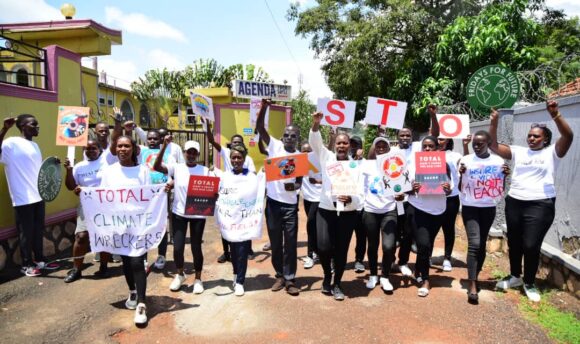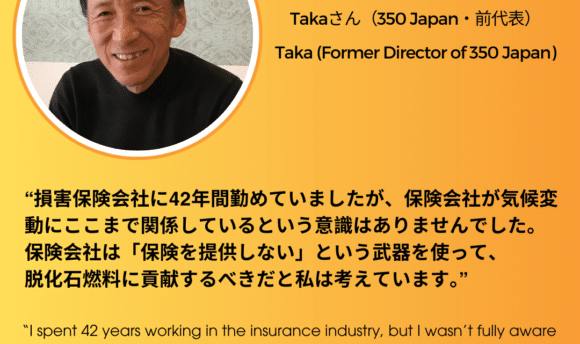Insure Our Future’s 8th scorecard Within Our Power was released at the end of 2024. The scorecard annually assesses the climate performance of global insurers based on their fossil fuel exclusion policies. This year, new research also reveals the extent to which insured losses can be attributed to climate change and presents data on the state of renewable energy insurance.
2024 Key Findings
For more than half of 28 insurers assessed – including MS&AD and Tokio Marine – climate-attributable insured losses surpassed fossil fuel premiums underwritten. This highlights how the accelerating impacts of climate change are taking their toll on insurers. For MS&AD and Tokio Marine, commercial fossil fuel clients represent only around 1% of total premiums underwritten. This raises serious questions about why these insurers continue to support the fossil fuel industry’s reckless oil and gas expansion which is exacerbating climate risks to the rest 99% of the companies’ portfolios.
2024 also saw the breaching of the critical 1.5°C global warming limit for the first time, with the number of people affected by extreme heat – made three times likelier due to climate change – reaching 5 billion worldwide.
Climate-Related Insurance Damages Account for Over One-Third of Total Losses in the Past 2 Decades
Research commissioned by Insure Our Future, and carried out by SEO Amsterdam Economics, revealed that approximately $600 billion insurance losses over the past 20 years can be attributed to climate change, amounting to over one-third of total weather-related insurance losses. This highlights the staggering climate cost-burden on communities as insurance companies pass on their losses.
Climate-attributed insurance losses have been growing at an average annual rate of 6.5% over the last decade, outpacing the growth of insured losses (4.9%) and expected to continue rising.
Only 38% of Total Economic Losses from Extreme Weather Disasters in 2023 was Insured
Swiss Re reports that only 38% of the total economic losses from extreme weather disasters were insured. This finding underscores the unjust cost burden faced by uninsured communities, while insured communities also face higher premiums.
The rising cost of home insurance is also a serious issue, with premiums increasing at double-digit rates in countries such as Japan, the U.S., the UK, and Australia.
Regional Standpoint: Asia
Among the top 10 insurance companies providing coverage to the fossil fuel industry, 8 are based in Asia, suggesting the key role played by Asian insurers in climate change mitigation on the global stage. Three Japanese companies—Tokio Marine, SOMPO, and MS&AD—are ranked in the top 10.
Research by Howden indicates that there is a big insurance gap that threatens to bottleneck up to 10 trillion USD of climate transition investments by 2030. As the U.S. may retreat from climate action, this presents an opportunity for Asian financial institutions to build renewable energy underwriting expertise and capture global market share. As of December 2024, the insurance industry lags significantly, with no major players aligned with a 1.5°C pathway.
Japanese Insurers’ Performance
Global action on climate remains slow, though there have been gradual changes to insurers’ climate policies. This section provides an overview of the three major Japanese insurance companies evaluated in the scorecard.
Tokio Marine
Rank: 15/26
Overall score: 1.37/10
Tokio Marine, the 15th largest fossil fuel underwriter in the world, announced an engagement policy requiring clients with high carbon emissions to develop decarbonization plans by 2030. Meanwhile, the company still permits new insurance contracts for general oil and gas projects.
SOMPO
Rank: 16/26
Overall score: 1.27/10
Sompo has adopted restrictions on coal and, unlike its Japanese peers, on tar sands companies. However, the company still insures new oil and gas projects without any restrictions and is known to be a major insurer for the Rio Grande LNG project.
Update:
In January 2025, Sompo updated its ESG Considerations policy, saying it will refer to international standards such as FPIC (Free, Prior and Informed Consent). This is the first time that a Japanese non-life insurance company has established a policy to respect FPIC in insurance underwriting and investment.
MS&AD
Rank: 18/26
Overall score: 1.21/10
MS&AD became the first Asian insurer to set an absolute target to reduce insured emissions, aiming for a 37% cut in domestic corporate portfolio emissions by 2030. However, to align with the Paris Agreement’s goal of limiting global temperature rise to 1.5°C, this target needs further strengthening to 45%.
Conclusion
Fossil fuel premiums make up under 2% of total premiums on average. As the study has shown, many insurance companies are now facing a situation where the risks of underwriting fossil fuel businesses outweigh the benefits.
Should insurers continue to support high-risk businesses like fossil fuel projects, given that these investments are likely to harm not only society but also their own finances? The findings suggest that the insurance industry is at a critical crossroads, needing to reconsider its role in society amid accelerating climate change.
With the 1.5°C threshold being crossed in 2024, Asia now faces a vital opportunity to benefit economically from moving away from fossil fuels. Insurance companies’ reluctance toward the transition to clean energy has caused a serious climate and insurance crisis, increasing the burden on society. In order to secure a future where insurance is chosen, companies must stop investing in high-risk fossil fuel projects and promote a rapid and fair transition to clean energy.




